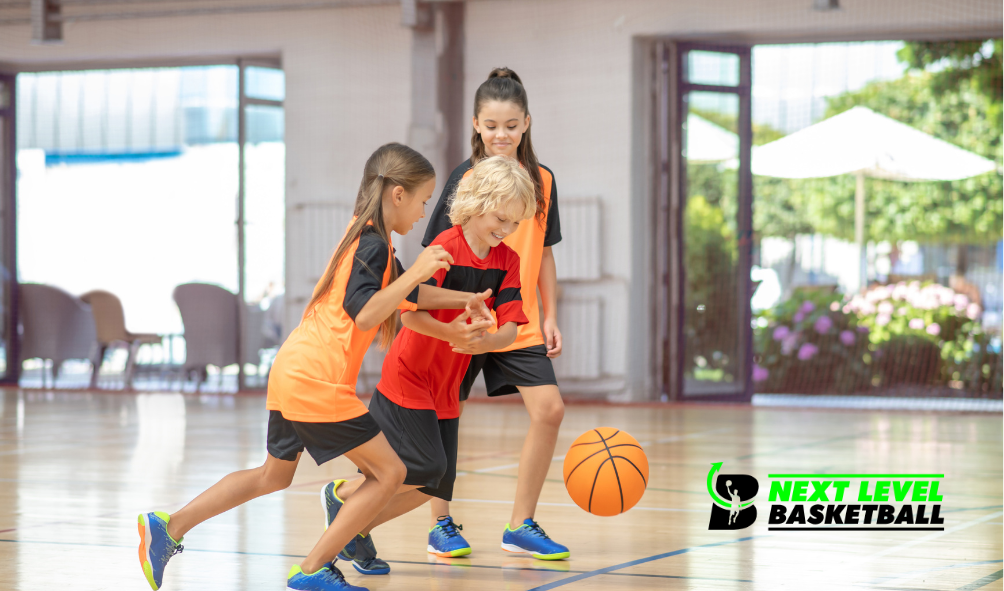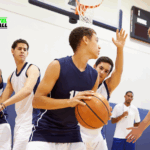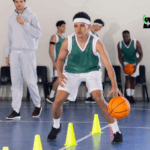Are you a parent or coach looking to mold the next generation of NBA superstars? Look no further than our ultimate basketball training for kids. With a focus on developing skills, building strength, and instilling a winning mindset, our program is designed to take young athletes to the next level.
Our brand voice is enthusiastic and motivating, speaking directly to parents and coaches who have big dreams for their children. We understand the importance of nurturing talent from a young age and believe that every child has the potential to become a future NBA star.
In our comprehensive basketball training for kids, your child will learn the fundamentals of the game, refine their shooting techniques, improve their footwork, and enhance their basketball IQ. Our experienced coaches will provide personalized guidance, helping each child reach their full potential both on and off the court.
With a track record of success and a reputation for excellence, our program has been trusted by aspiring young athletes and their families for years. Join us today and give your child the tools they need to achieve their basketball dreams.
Benefits of Basketball Training for Kids
Basketball training program for kids offers numerous benefits that extend beyond the basketball court. Not only does it help children develop physical skills, but it also promotes mental and emotional growth. Engaging in regular basketball training can contribute to a child’s overall well-being and personal development.
First and foremost, basketball training for kids promotes physical fitness. The sport involves constant movement, which helps children improve their cardiovascular endurance, agility, and coordination. Through drills and exercises, kids can develop strength, speed, and flexibility. These physical improvements can have a positive impact on their overall health and well-being.
Moreover, basketball training teaches important life skills such as teamwork, discipline, and perseverance. By working together as a team, kids learn how to communicate effectively, trust their teammates, and overcome challenges. The discipline required to follow a training program and commit to regular practice sessions also instills valuable life lessons that can be applied in various aspects of their lives.
Additionally, basketball training helps children build self-confidence and self-esteem. As they improve their skills and see their progress, they gain a sense of accomplishment and pride. This boost in confidence can positively impact their self-image and translate into other areas of their lives, such as academics or social interactions.
In summary, basketball training for kids offers a wide range of benefits. It promotes physical fitness, teaches important life skills, and boosts self-confidence. By engaging in regular training, children can develop not only as basketball players but also as well-rounded individuals.
Key Skills to Focus on in Basketball Training for Kids
When designing a kids’ basketball training program, it is important to focus on key skills that will lay a strong foundation for their development as players. Here are some of the essential skills that should be emphasized:
- Fundamentals: Mastering the fundamentals is crucial for any basketball player, regardless of their age or skill level. This includes dribbling, shooting, passing, and defense. By ensuring that kids have a solid understanding of these basic skills, they will be well-equipped to progress in their basketball journey.
- Shooting Techniques: Shooting is one of the most important basketball skills. In training, kids should learn proper shooting techniques, including footwork, body positioning, and hand placement. Developing a consistent shooting form at a young age will benefit them greatly as they advance in their basketball careers.
- Footwork: Good footwork is essential for agility, balance, and quickness on the court. Kids should learn various footwork drills that will improve their ability to move efficiently and change directions quickly. Proper footwork can make a significant difference in their overall performance on the court.
- Basketball IQ: Basketball IQ refers to a player’s understanding of the game, including reading the defense, making smart decisions, and anticipating the actions of opponents and teammates. By incorporating game situations and strategic drills into the training program, kids can develop their basketball IQ and make smarter decisions on the court.
By focusing on these key skills in kids’ basketball training, coaches, and parents can help lay a strong foundation for their development as players. Mastering the fundamentals, shooting techniques, footwork, and basketball IQ will provide young athletes with a solid skill set that they can build upon as they progress in their basketball journey.
The Role of Coaches and Parents in Supporting Basketball Training for Kids
Coaches and parents play a crucial role in supporting and nurturing basketball training for kids. Their involvement and support can greatly impact a child’s development as a basketball player and as an individual. Here are some important ways in which coaches and parents can contribute:
- Positive Reinforcement: Coaches and parents should provide positive reinforcement and encouragement throughout the training process. Recognizing and praising a child’s efforts, improvements, and achievements can boost their confidence and motivation. This positive feedback will help them develop a love for the sport and a desire to continue improving.
- Setting Realistic Goals: Coaches and parents should work together to set realistic goals for the child’s basketball training. These goals should challenge the child to improve and grow, but also be attainable. Setting both short-term and long-term goals will provide a sense of direction and purpose, allowing the child to track their progress and celebrate their achievements.
- Effective Communication: Open and effective communication between coaches, parents, and the child is essential for a successful training program. Coaches should regularly update parents on the child’s progress and provide feedback on areas that need improvement. Likewise, parents should communicate any concerns or questions they may have. This collaborative approach ensures that everyone is on the same page and working towards the same goals.
- Creating a Supportive Environment: Coaches and parents should create a supportive and nurturing environment for the child’s basketball training. This includes fostering a sense of teamwork, respect, and sportsmanship. When kids feel supported and valued, they are more likely to enjoy the training process and develop a lifelong love for the sport.
- Leading by Example: Coaches and parents should lead by example and demonstrate good sportsmanship, dedication, and a strong work ethic. Children often model the behavior of adults around them, so coaches and parents need to embody the qualities they want to instill in young athletes. By showing passion for the sport and a commitment to continuous improvement, they can inspire kids to do the same.
By actively supporting their child’s basketball training, coaches and parents can contribute to their overall development as athletes and individuals. Through positive reinforcement, goal setting, effective communication, creating a supportive environment, and leading by example, they can help young athletes reach their full potential and enjoy the journey along the way.
Age-appropriate Drills and Exercises in Basketball Training for Kids
When designing drills and exercises in basketball training for kids, it is important to consider their age, skill level, and physical capabilities. Age-appropriate drills ensure that children are challenged without being overwhelmed, allowing them to develop their skills at an appropriate pace. Here are some examples of age-appropriate drills and exercises:
- Dribbling Drills: For younger kids, simple dribbling drills that focus on developing basic dribbling skills are ideal. These drills can involve dribbling through cones, around obstacles, or in a zigzag pattern. As kids progress in age and skill level, more advanced dribbling drills can be introduced, such as crossover dribbles and between-the-legs dribbles.
- Shooting Drills: Shooting drills for young kids should focus on developing proper shooting form and technique. This can include stationary shooting, shooting from various spots on the court, and shooting with proper footwork. As kids become more proficient, drills that incorporate game-like situations, such as shooting under pressure or off the dribble, can be introduced.
- Passing Drills: Passing drills for young kids should start with basic chest passes and bounce passes. These drills can involve passing to stationary targets or moving targets. As kids develop their passing skills, more advanced drills focusing on different types of passes, such as overhead passes and behind-the-back passes, can be introduced.
- Footwork Drills: Footwork drills are essential for developing agility, balance, and quickness. For younger kids, basic footwork drills such as ladder drills and quick feet drills are appropriate. As kids progress, more advanced footwork drills that involve a change of direction, pivoting, and defensive movements can be incorporated.
- Game-like Drills: As kids become more proficient in their skills, incorporating game-like drills into their training can be beneficial. These drills simulate game situations and help kids apply their skills in a realistic context. Examples include 1-on-1 or 3-on-3 drills, fast break drills, and shooting competitions.
It is important to note that the difficulty level of drills should be adjusted based on the individual child’s abilities and progression. Coaches should observe and assess each child’s performance to ensure that they are appropriately challenged and motivated. By incorporating age-appropriate drills and exercises, kids’ basketball training can be engaging, enjoyable, and conducive to skill development.
The Importance of Nutrition and Rest in Basketball Training
Proper nutrition and adequate rest are crucial components of basketball training. These factors play a significant role in a child’s overall health, energy levels, and performance on the court. By focusing on nutrition and rest, parents and coaches can support the child’s physical and mental well-being. Here’s why nutrition and rest are important:
Nutrition:
- Fueling the Body: Proper nutrition ensures that the child’s body is adequately fueled for training sessions and games. A well-balanced diet that includes carbohydrates, proteins, healthy fats, and vitamins and minerals provides the necessary energy and nutrients for optimal performance.
- Muscle Recovery: Nutrition plays a crucial role in muscle recovery and repair. After intense training sessions, the body requires protein and other nutrients to rebuild and strengthen muscles. Including protein-rich foods such as lean meats, fish, eggs, and legumes in the child’s diet can aid in muscle recovery and prevent injuries.
- Hydration: Staying properly hydrated is essential for athletic performance. Kids should be encouraged to drink water before, during, and after training sessions to maintain optimal hydration levels. Dehydration can lead to decreased energy levels, muscle cramps, and impaired cognitive function.
- Maintaining a Healthy Weight: Proper nutrition helps children maintain a healthy weight, which is important for overall health and performance. Excess body weight can hinder agility and mobility on the basketball court. A balanced diet combined with regular physical activity can help children achieve and maintain a healthy weight.
Rest:
- Muscle Recovery and Growth: Rest is essential for the body to recover from intense training and promote muscle growth. During sleep, the body releases growth hormones that aid in muscle repair and development. Sufficient rest allows the child’s body to adapt to the demands of training and become stronger.
- Injury Prevention: Rest plays a crucial role in injury prevention. Continuous training without adequate rest can lead to overuse injuries and burnout. Rest days allow the body to recover, repair, and reduce the risk of injuries. Coaches and parents should ensure that children have regular rest days in their training programs.
- Mental Well-being: Rest is not only important for physical recovery but also for mental well-being. Continuous training and competition can put a mental strain on young athletes. Sufficient rest allows children to recharge, relax, and maintain a healthy mental state. This helps prevent burnout and promotes a positive attitude towards training and competition.
By prioritizing proper nutrition and adequate rest, parents and coaches can support the child’s overall health, energy levels, and performance on the basketball court. A well-balanced diet, hydration, and regular rest days contribute to optimal physical and mental well-being, allowing young athletes to thrive in basketball training.
Let your child start their journey to becoming a basketball star with Next Level Basketball. Call 954-621-8470 to book your kid’s first session.





